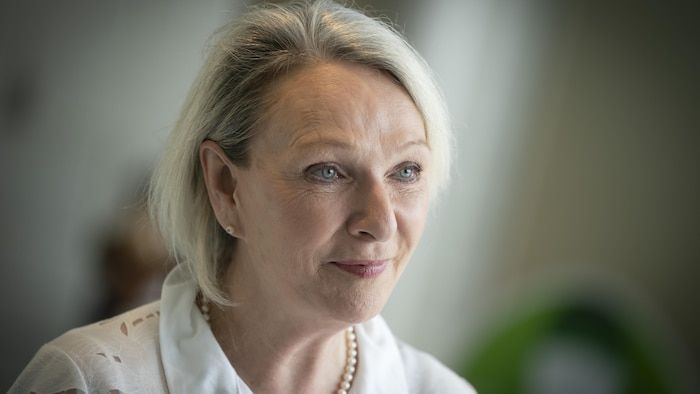Access to medical assistance in dying has largely monopolized debates on end-of-life care in recent years. This medical procedure is obtained today by nearly 6,000 people each year in Quebec.
However, the president of the Commission on End-of-Life Care, Dr. Michel A. Bureau, now intends to focus the organization’s efforts on access to palliative care. Care offered to more than 50,000 people per year.
The last five years, we have spent a lot of time on medical assistance in dying. But here, the mandate of the Commission for the next five years will be to concentrate on palliative care.
According to the President of the Commission, there is an urgent need to act. There are patients who are left to their own devices and need palliative care
he says.
Open in full screen mode
Dr. Michel Bureau, President of the Commission on End-of-Life Care
Photo: Radio-Canada
Palliative care aims to relieve the suffering of a person at the end of life without hastening or delaying death, to help them maintain the best possible quality of life and offer this person and their loved ones the necessary support
we can read in the Commission’s reports.
Dr Bureau says he adds his voice to those who believe that catching up is necessary. Yes, catching up [à faire] is very important, it’s not me who says it, it’s the ministries, the minister, the doctors. We need to work on this
he maintains.
The president of the Quebec Society of Palliative Care Physicians has already declared that there was a form of lottery
for access to such care.
The reality is that there is always a sort of postal code lottery and, depending on the territory where you live, palliative care is not equivalent. There is great inequality depending on the CLSC [près desquels] we reside
lamented Dr. Olivia Nguyen in March 2023.
Open in full screen mode
Dr. Olivia Nguyen is president of the Quebec Society of Palliative Care Physicians.
Photo: Radio-Canada
As Dr. Bureau explains, there are regions that are less equipped with doctors and professionals
.
The health network’s service offering and capacity to respond varies by a factor of two in certain regions.
he points out.
Slowdown in medical assistance in dying
After years of successive increases beyond 40%, the use of medical assistance in dying (MAiD) shows a pause. According to monthly data published by the Commission on End-of-Life Care, the number of patients who received medical assistance in dying has remained stable in recent months.
For the most recent six-month period (September 2023 to February 2024), the number of patients receiving medical assistance in dying fluctuated between 425 and 475 per month, a similar number compared to the same period of the ‘last year.
Dr Michel Bureau, president of the Commission, sees it as a temporary pause. % to 15% increase per year”,”text”:”There is a period of stability, but I anticipate that we will continue to have 10% to 15% increase per year”}}”>There is a period of stability, but I anticipate that we will continue to have 10% to 15% increase per year
he says.
For the whole of 2023, 5,686 people obtained medical assistance in dying, the latest data shows. This number corresponds to more than 7% of deaths recorded in Quebec. There were less than 500 in 2016.
In just a few years, Quebec has become the place in the world where the use of medical assistance in dying is most frequent. This is more than double the proportion that exists in Ontario.
Understanding the use of MAID
Faced with the interest in recent years in obtaining medical assistance in dying, the Minister for Health and Seniors, Sonia Bélanger, recently commissioned a research team which will have to look into the motives of users.

Open in full screen mode
Sonia Bélanger, Minister for Health and Seniors
Photo: Radio-Canada / Ivanoh Demers
The research budget planned for this project under the Quebec Research Fund amounts to more than $920,000 over three years.
We have very high social acceptability and this is something that we must understand to continue to better serve Quebecers, Minister Bélanger declared in writing. I will follow the research findings closely.
Quebec wants to expand theAMM from the fall to advance requests for people suffering from a major neurocognitive disorder such as Alzheimer’s disease.
Minister Bélanger recently asked the federal government to make an amendment to the Criminal Code only in Quebec in order to protect health professionals from possible prosecution.








